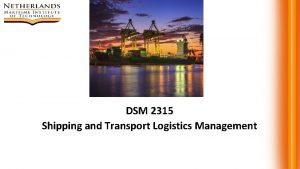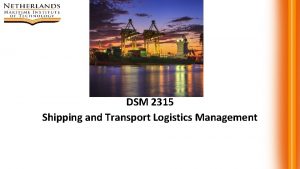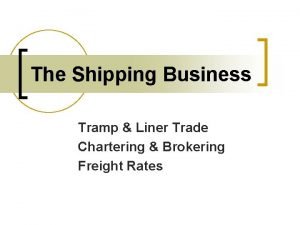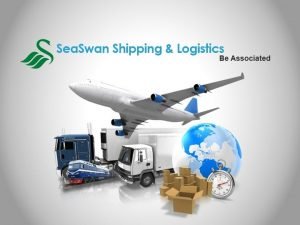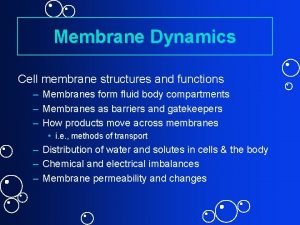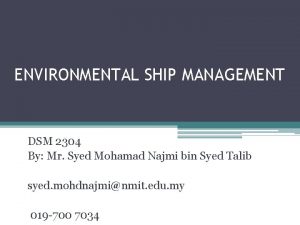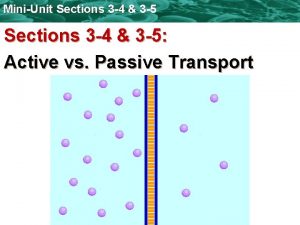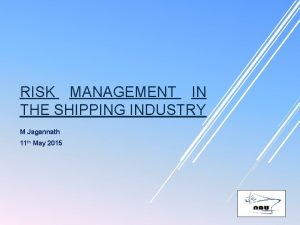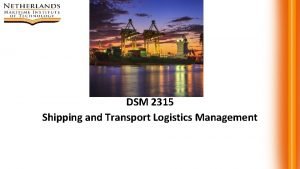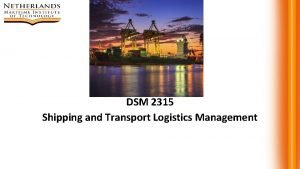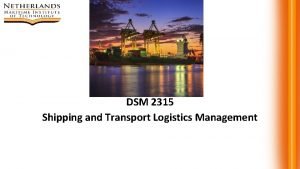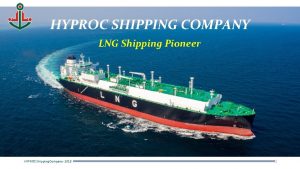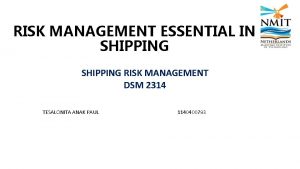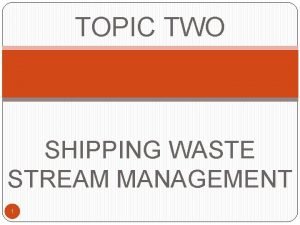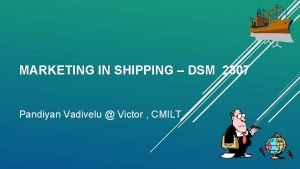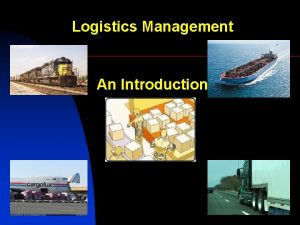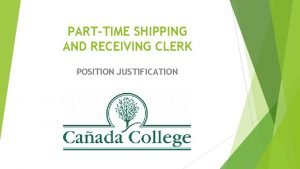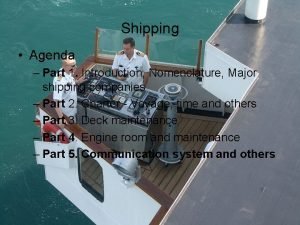DSM 2315 Shipping and Transport Logistics Management Logistics

























- Slides: 25

DSM 2315 Shipping and Transport Logistics Management

Logistics • What is logistics • The Oxford English Dictionarylogistics as "the branch of military science relating to procuring, maintaining and transporting material, personnel and facilities. " • Council of Logistics Management definition: “Logistics is that part of the supply chain process that plans, implements, and controls the efficient, effective forward and reverse flow and storage of goods, services, and related information between the point of origin and the point of consumption in order to meet customers’ requirements. ” • Logistic vs Logistics • Logistics Management Synonyms: • Logistical Management, Business Logistics, Channel Management, Materials Management, Distribution Management, Physical defines Distribution, Industrial Logistics, Quick-response systems, Supply Chain Management

Components of Logistics Management

2. Parties involved in Shipping and Transportation • Carrier is an organization that transports a product or service. • Shipper is the person or company that places a shipment with the carrier to be transported from origin to a destination

2. Parties involved in Shipping and Transportation 2. 1 Roles of Non-Vessel Operating Common Carrier (NVOCC) • NVOCCs don't own and operate their own vessels, but they do play the role of carrier, offering the services of other parties, such as rail freighters, air-cargo lines, trucking companies, consolidation warehouses and ocean freighters. • A non-vessel operating common carrier can be described as a carrier to the shipper and a shipper to the carrier. • Despite not actually owning the vessel, an NVOCC is, in fact, governed by the United States Federal Maritime Commission (FMC)

2. 2 Freight Forwarder • A freight forwarder is to commodities as a travel agent is to people, acting as a third-party to arrange the movement of goods from their domestic origin to a foreign destination. • Freight forwarders, while not carriers themselves, coordinate the movement of cargo by using the services of other parties, including ocean freighters, air-cargo lines, rail freighters and trucking companies.

Differences Between NVOCC and Freight Forwarder • A non-vessel operating common carrier and a freight forwarder offer similar international shipping services but play different roles during the movement of cargo. • As instructed by the shipper/customer, NVOCCs and freight forwarders may be responsible for booking space on the carrier, documenting exports, establishing cargo insurance, advising the shipper on foreign import regulations, providing guidance on proper packaging, marking and labeling of commodities and arranging the packing and containerizing of goods.

Differences Between NVOCC and Freight Forwarder (con’t) 1. NVOCCs can (and frequently do) own and operate the containers they ship; they may also lease (for their own use or others’) said containers. Cutting out the middle man, these workers eliminate steps within the shipping process, as well as those who are involved in each step. Freight forwarders do not (and cannot) follow this same protocol. 2. Certain countries, such as the United States, require NVOCC operators to make a public tariff; this takes place when each respective operator reports his or her tariffs to the correct government branch. Each country has various rules set into place, including who is to be the point of contact, and when they should be contacted. Again, this isn’t requested of freight forwarders. 3. Depending on the location, NVOCCs may have to take on the status of a “virtual carrier”. While other places require each NVOCC to take on the liabilities of the carrier. This is considered to be somewhat riskier, as well as taking more responsibilities, but many NVOCCs say that it is more than worth the added effort.

Differences Between NVOCC and Freight Forwarder (con’t) 4. Freight forwarding companies may act as either an agent or partner for a NVOCC; the vice versa is not true. Again, this provides more freedom and allows NVOCCs to adjust to the task as necessary. 5. Documentation. Freight forwarders gather all required documentation for entry to foreign countries from their customers and carriers, amended to comply with foreign regulations, and forwarded to the final destination party for clearance. NVOCCs, however, act as the carrier and issue their own bills of lading or air waybills. These carriers amend the commercial invoice and packing list from the customer to comply with foreign entry regulations before forwarding the documentation to their foreign agent, who ensures clearance, breakdown of the container and arrangement for delivery to the consignee.

2. 3 Third Party Logistics (3 PL) • A 3 PL (third-party logistics) is a provider of outsourced logistics services. Logistic services encompass anything that involves management of the way resources are moved to the areas where they are required. The term comes from the military. • In business, 3 PL has a broad meaning that can be applied to any service contract that involves storing or shipping things. A 3 PL service may be a single service such as transportation or warehouse storage or it can be a system-wide bundle of services capable of managing the entire supply chain. • The term 3 PL was originally coined to differentiate logistic providers who used the Internet to enhance their services from those that did not. • A third party logistics company is one that works with shippers in order to manage another company’s logistics operations department. 3 PL is the action of outsourcing activities that are related to logistics and distribution.

2. 4 Fourth Party Logistics (4 PL) • Arrangement in which a firm contracts out (outsources) its logistical operations to two or more specialist firms (the third party logistics) and hires another specialist firm (the fourth party) to coordinate the activities of the third parties. • The concept of a 4 PL provider is an integrator that accumulates resources, capabilities and technologies to run complete supply chain solutions.

Main Difference between 3 PLs and 4 PLs • The 3 PL targets a single function, whereas the 4 PL manages the entire process. • A 4 PL may manage the 3 PL.

Main Difference between 1 - 4 PLs

Main Difference between 3 PLs and 4 PLs

2. 5 Ship Brokers • Shipbroking is a financial service, which forms part of the global shipping industry. • Shipbrokers are specialist intermediaries/negotiators (i. e. brokers) between shipowners and charterers who use ships to transport cargo, or between buyers and sellers of ships. The Institute of Chartered Shipbrokers sets educational standards throughout the industry, Fellowship of which is considered a great honour. • Some brokerage firms have developed into large companies, incorporating departments specialising in various sectors, e. g. Dry Cargo Chartering, Tanker Chartering, Container Chartering, Sale & Purchase, Demolition and Research.

Dry cargo broking • Dry cargo brokers are typically specialists in the chartering of Bulk carriers, and are appointed to act either for a shipowner looking for employment for a ship, or a charterer with a cargo to be shipped. • Dry cargo chartering brokers have to maintain large databases of vessel positions, cargoes and rates and pay close attention to the direction of the markets so that they can advise their clients accurately as to how to maximize profits or minimize expenses. • Dry cargo shipping can be categorized by Vessel size: namely, Bulkers such as Capesizes, Panamaxes and Handysize are the main sectors. Each size of vessel suits different types of cargo and trade routes. Thus owners, charterers and brokers tend to specialize in one or other of these sectors.

Types of Bulker • Capesize ships are the largest cargo ships; ships which are too large to transit the Suez Canal (Suezmax limits) or Panama Canal (Panamax limits), and so have to pass either the Cape of Good Hope or Cape Horn to traverse between oceans. Capesize vessels are typically above 150, 000 long tons deadweight (DWT), and ships in this class include bulk carriers transporting coal, ore, and other commodity raw materials. • Panamaxes are ships traveling through the Panama Canal, which size limits of which is 110 ft (33. 53 m) wide, 1, 050 ft (320. 04 m) long, and 41. 2 ft (12. 56 m) deep. • Handysize refers to a dry bulk vessel (or, less commonly, to a product tanker) with deadweight of up to 50, 000 tonnes.

Tanker broking • Tanker brokers specialize in the chartering of Tankers, which requires different skills and knowledge from Dry cargo broking. • Tanker brokers may specialize in crude oil, gas, oil products or chemical tankers. • Tanker brokers negotiate maritime contracts, known as Charter Parties. • The main terms of negotiation are freight/hire and demurrage (a charge payable to the owner of a chartered ship on failure to load or discharge the ship within the time agreed). • Oil being a fast moving trade, freight rates for crude oil tanker charters are most commonly based on the Worldscale Index; the Worldscale Association publishes flat rates annually. • Some specific voyages, such as named voyages (i. e. , from A to B) and for specialist ships, like LNG (liquefied natural gas) tankers (a highly specialized sector of the tanker market), freight rates can be agreed at a fixed rate between the parties.

Sale and purchase • S&P brokers handle the buying and selling of existing vessels in the secondary market or new ships (called newbuildings, in industry parlance). • S&P brokers discuss opportunities and market trends with shipowners, charterers, investors and bankers, report on market sales, vessel values, market trends and activity. • When a shipowner has a vessel to sell or is looking for a vessel to acquire, the shipbroker will source the market for suitable tonnage, discuss with the counterparty or their broker the main points of a transaction and they eventually negotiate all the details. • During the negotiations, the shipbrokers do not only negotiate the price of the vessel on behalf of the principals but also all the logistical details for the transfer of the title and the vessel herself to the buyers. • During the negotiations minor disputes may have to be handled given that the market may be moving in favor of the buyer (vessel price is softening) or in favor of the seller (vessel price is strengthening) giving each party a reason to cancel the transaction. • When shipbrokers act on behalf of passive investors or financial buyers, they may also have to advise and source employment for the vessels, a vessel manager and oversee such agreements. • Some S&P brokers specialize in the sale of ships for scrapping, which requires a different set of skills.

2. 5 Ship Brokers (con’t) Container broking • Container brokers specialise in the chartering of container ships and provide container ship owners and charterers with market-related information. Demolition and Research • Demolition contrasts with deconstruction, which involves taking a building apart while carefully preserving valuable elements for re-use. The principal shipping and shipbroking centres are London, Athens, Oslo, New York and Singapore. Other places like Tokyo (focused on Japanese domestic trade), Hong Kong, Shanghai, Delhi and Mumbai; Copenhagen, Geneva, Genoa, Hamburg, Paris and Piraeus in Europe; and in North America, Connecticut, Houston and Montreal.

Tasks and Responsibilities of Shipping Agents • Succinctly, the term shipping agent refers to the relationship between the principal (in this case the shipping company conveying the goods) and its representative, whereby the principal, expressly or impliedly, authorizes the agent to work under his control and on his behalf. • The responsibilities/competencies as well as the remuneration of the agent may be explicitly entered into a contract which has been concluded between himself and the ship owner. This practice is very common in the cargo trade, booking agents, etc. • The duties of a cargo broker are similar to those of a shipping agent, but may also vary. For example, a cargo broker will also book outward cargo and inform the shippers on which quay and when the goods are to be presented and when loading and unloading is due to start. He will draw up booking lists according to the incoming bookings and ensure that the manifest department collects the shipping documents (shipping permits, bills of lading) which are necessary to commence the loading and unloading operations. The collected documents are also compared with the booking lists.

Responsibilities of shipping agents include: • • • ensuring a berth for the incoming ship arranging for the pilot and the tugs if necessary drawing up the documents for the customs and harbour services arranging for the necessary ship fresh water / provisions arranging for the necessary doctor for the crew any medical assistance arranging for storage bunkers if these are needed arranging for the necessary repairs conveying instructions to and from the ship owner organizing the supply, transport and the handling of the goods organizing the necessary contacts with the stevedores collecting freights, cargoes contacting shippers and the receivers of the goods

Responsibilities of shipping agents include (con’t) • In the case of damage to cargo or the ship, the shipping agent also makes the necessary arrangements (at the request of the ship's master or owner) with the insurance company, and for nautical inspections and the services of experts or surveyors, etc. Fees • Shipping agents or port agents receive a fee called an agency fee for their services.

Discussion/Exercise Difference(s) between Ship Broker and Shipping Agents Freight Broker • A freight broker is a self-sufficient person who must have authority to run his or her business. A completely self-employed broker can send invoices to customers on his or her own name. Freight brokers also pay to freight carriers. In short, they run their whole business independently. Freight Broker Agent • Agents typically work for another broker and thus they need to have a broker authority. They endorse the authority of the brokers for whom they work. They aren’t responsible for paying to freight carriers, trucks, and sending invoices to the customers. Freight broker agents charge broker a commission for their assistance or work.

How opportunities vary for brokers and agents • Agents have all the freedom in the world to expand their client-base, and that too without sticking their head into broker authority and invoicing. There are many agents who make a handsome salary every month and find no need of becoming a broker. An agent needs to keep a track on the market, so they don’t miss on any major update that may impact on their business. They should also be capable of understanding all sorts of trucking and logistics solutions offered by the industry. • Unlike agents, freight brokers have more responsibilities imposed by the government of the respective nation. In the USA, brokers apply for authority through the FMCSA, which is an acronym of Federal Motor Carrier Safety Administration. FMCSA is managed by the US department of transportation. Brokers must have proper insurance and forms, which can be a tedious and time-consuming job if you’re not well-acquainted with the freight shipping industry. • Agents usually work from their home independently, without a single employee. So, there is no one to compete with. And no register! The scenario is different for freight brokers. They need to collect payments from their clients and make payments to the trucks they used for freight shipping. If the broker has an agent or a team of agent, he or she needs to pay them as well; the amount is a commission which is determined by considering the gross line haul rate. • The agent calculates the line haul rate for the shipment, look for trucks, response to customer calls, and help the truck driver with the directions to the receiver for a broker he or she works for. But the trucking companies send invoices to the broker, not to the agent. As you can see, a broker has to do more of the administrative kind of work. • Typically, the agent works for a broker as an independent contractor. A committed work from home agent could earn more than $1500 a day. Cargo freight shipping has become one of the fastest growing industries today.
 Neurodevelopmental disorders dsm-5 ppt
Neurodevelopmental disorders dsm-5 ppt Psychotic disorder
Psychotic disorder Dsm 5 vs dsm 4
Dsm 5 vs dsm 4 Codigo trastorno depresivo mayor dsm v
Codigo trastorno depresivo mayor dsm v Sdl 2315
Sdl 2315 Dsm ship management
Dsm ship management Types of tramp chartering
Types of tramp chartering Sssl port
Sssl port Antiporter
Antiporter Primary vs secondary active transport
Primary vs secondary active transport Active transport diagram
Active transport diagram Dsm ship management
Dsm ship management Dsm ship management
Dsm ship management Now answer the questions
Now answer the questions Active transport vs passive transport venn diagram
Active transport vs passive transport venn diagram Unlike passive transport, active transport requires *
Unlike passive transport, active transport requires * Primary active transport vs secondary active transport
Primary active transport vs secondary active transport Bioflix activity membrane transport active transport
Bioflix activity membrane transport active transport Isotonic in biology
Isotonic in biology Risk management in shipping industry
Risk management in shipping industry Megasportsworld betting
Megasportsworld betting Distributed shared memory
Distributed shared memory Dsm-5 autismo
Dsm-5 autismo Dsm 5 axis chart
Dsm 5 axis chart Somatic vs factitious
Somatic vs factitious Sensory processing disorder dsm
Sensory processing disorder dsm




